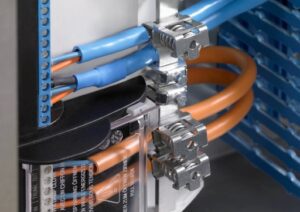Electrical cables are essential components used to transmit electricity from one place to another. They are composed of several wires enclosed in an insulated wrapper designed to resist environmental factors and enhance safety.
Home and business installations such as security systems, heating and cooling systems, and digital connectivity solutions are vital for safety, comfort, and operational efficiency, affecting productivity, energy conservation, and overall quality of life.
Types of Electrical Cables
Electrical cables are categorized based on insulation type, size, and usage. Notable types include coaxial cables, ethernet cables, multi-conductor cables, and fibre optic cables. Each electrical cable Malaysia serves unique functionalities in various industries including telecommunications, computers, and power distribution.
Non-metallic sheathed Cable, often referred to as Romex, is a type of electricity-conducting cable commonly used in residential wiring. It’s safe, durable, and easy to install due to its flexible PVC insulation and sheathing.
Underground Feeder Cable (UF) is a type of cable used in outdoor electrical wiring. It’s insulated and waterproof, designed to resist soil corrosion and moisture – ideal for burial directly underground without a conduit.
Metal Clad Cable, often abbreviated as MC cable, is a versatile and robust electrical wiring solution. Consisting of one or more conductors, each individually insulated and encased in a flexible metal sheath, it ensures safety and protection from environmental damage.
Multi-conductor cable is a form of electrical cable that consists of multiple conducting wires. It is primarily used in data transmission, signalling and control functionality. Each conductor is individually insulated, optimizing safety and efficiency.
Coaxial cable is a type of copper cable specially designed with a metal shield to block signal interference. It transmits high-frequency electrical signals with great efficiency, making it ideal for television and internet connections.
Armored Cable, also known as BX cable, is a type of electrical wiring, wrapped in a robust metal sheathing for added protection. It’s primarily utilized in commercial or industrial settings due to its durability and safety aspect.
[ 1] Features of High-Quality Electrical Cables
The durability and material quality of a product determines its lifespan and efficiency. High-quality materials are usually durable, and thus resist wear and tear, making the product reliable and cost-effective in the long run.
Heat resistance refers to the ability of a material to withstand high temperatures without any degradation in its properties. It is a critical feature for materials used in high-temperature environments such as spacecraft, furnaces, and industrial machinery.
Transmission capability refers to the maximum capacity of a communication system to transmit data effectively from one point to another. This determines the speed and efficiency of data transfer in a network.
Safety standards compliance is crucial to ensure a secure and harm-free environment for employees and clients. It involves adhering to regulations and guidelines set by a regulatory body to prevent accidents and safeguard health.
[ 2 ] Importance of High-Quality Electrical Cables in Home Installations
Safety assurance involves implementing systems and measures to prevent accidents or damage. It’s an integral part of various fields, ensuring the welfare of people, protection of properties, and smooth workflow.
Long-lasting service refers to the prolonged and consistent provision of product functionality, support, or maintenance. It ensures customer satisfaction, adds value to products, and builds a viable business-customer relationship.
Energy efficiency refers to the reduction of energy consumption while providing the same level of output. Effective methods include optimizing energy use in buildings, industry, and transportation, which leads to cost savings and environmental protection.
Cost-effectiveness refers to the economic analysis of a task, project, or system where the best outcomes are desired for the least cost. It plays a crucial role in making informed decisions, maximizing the use of resources, and achieving optimal results.
[ 3 ] Importance of High-Quality Electrical Cables in Business Installations
Dependability and reliability are fundamental traits for building trust and establishing strong relationships, whether personal or professional. They signify a person’s consistency in delivering their promises, tasks, or responsibilities accurately and promptly.
Running high-power equipment requires expertise to operate safely and efficiently. This equipment, used in various industries, provides substantial force and speed but can be hazardous without appropriate training and caution.
Effective contribution to business operations involves streamlining processes, improving productivity, and enhancing profitability. It also includes implementing strategic plans, managing resources efficiently, and encouraging innovation to drive business growth and sustainability.
Enhancing electrical system lifespan involves regular maintenance, proper installation, and the use of quality equipment. These steps ensure efficiency, safety, and a prolonged operational life, reducing overall repair and replacement costs.
[ 4 ] Selecting the Right Electrical Cable for Installations
Understanding power requirements is crucial when setting up electrical systems. It involves calculating the total energy consumption of devices, allowing for a suitable and safe power supply, preventing system failures, and saving energy.
Consideration of electrical codes is crucial during any construction or renovation project. They ensure safety, prevent electrical fires, and are legally required for residential and commercial buildings. These codes provide standard guidelines that electricians must follow.
Assessing cable insulation and jackets involves examining their physical condition to detect any damages, like cracks or tears, which could affect their safety and performance. It also includes checking their resistance to heat, cold and chemical exposure.
Evaluating environmental considerations involves carefully assessing the impacts of activities or policies on natural resources. It encompasses pollution control, biodiversity conservation, and sustainable resource use to ensure minimal ecological damage.
[ 5] Professional Installation of Electrical Cables
Electricians play a crucial role in ensuring the safe and effective distribution of electrical power within residential, commercial, and industrial setups. They install, maintain, and repair electrical systems, guaranteeing safe and functional environments.
Professional installation ensures efficiency, safety, and durability. Expert installers offer quality workmanship, preventing damage or malfunctions. This often includes warranted services, potentially saving time and money in the long run.
The common installation process involves downloading software from a trusted source, running the setup file, agreeing to terms and conditions, and following the on-screen installation steps until completion.

[ 6 ] Maintenance of Electrical Cables
Regular inspection is a fundamental aspect of maintaining the safety, efficiency, and longevity of systems and equipment. It involves a systematic examination to identify potential failures and necessary repairs before they escalate into extensive damages.
Dealing with wear and tear involves regular maintenance and timely repair of used items. This practice extends the item’s lifespan, ensuring optimal performance while potentially saving money in the long run.
Updating old wiring systems is vital for safety and efficiency. It includes replacing obsolete wires, sockets, and switches, reducing risks of electrical faults, fires, or electrocutions and enhancing electrical capacity. Regular inspections are crucial to ensure wiring integrity.
Conclusion
The diversity in electrical cables, from Non-Metallic Sheathed Cables (Romex) to Coaxial Cables and Armored Cables, underscores their versatility across industries. Each type serves distinct functionalities, ensuring connectivity, transmission, and protection against environmental factors, vital for telecommunications, computers, and power distribution.
The defining features of high-quality electrical cables, such as durability, heat resistance, transmission capability, and safety standards compliance, are paramount for reliability, safety, and operational efficiency. Adherence to these features ensures longevity, safety, and conformity to set regulations.
The importance of high-quality electrical cables in home and business installations cannot be overstated. From providing safety assurance and energy efficiency to ensuring long-lasting service and cost-effectiveness, these cables play a pivotal role in fostering secure, energy-efficient, and cost-effective environments.
Understanding the Different Types of Electrical Cables and their Applications







